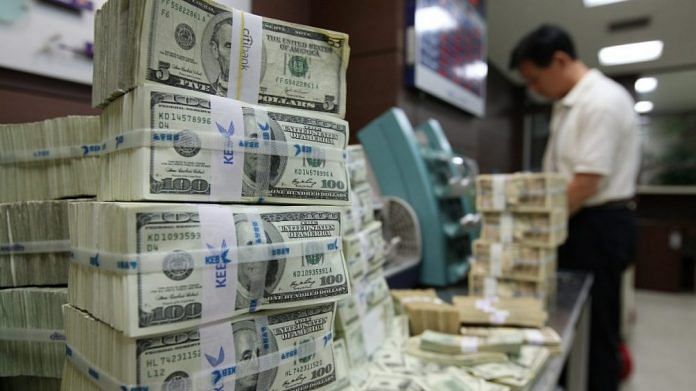Analysts say although current levels are comfortable they’re apprehensive of the pace at which reserves are dropping.
New Delhi: India’s foreign exchange reserves, which touched a high of $426 billion in April, have dropped to the $400.8 billion mark, according to data released by the Reserve Bank of India (RBI) Friday.
Analysts said although the current levels were comfortable they are worried at the pace at which the reserves are dropping.
Finance Minister Arun Jaitley, in a series of tweets, said the situation was being closely monitored and that foreign exchange reserves were adequate to address volatility in the currency market.
Also read: The rupee fell past 70/$ and recovered. But don’t take your seatbelts off just yet
“India’s foreign exchange reserves are comfortable by global standards and sufficient to mitigate any undue volatility in the foreign exchange market,” Jaitley tweeted.
“The drop in reserves was expected as the RBI has been continuously cushioning the rupee and now with volatility and uncertainty rising in the emerging markets, the rupee is unlikely to recover soon,” an economist associated with a Mumbai-based PSU bank told ThePrint.
The country’s central bank has been aggressively supporting the Indian rupee, which is one of the worst performing currencies in Asia. On Tuesday, for the first time, the rupee breached the psychological 70 to a dollar level. Currency analysts said that the Indian rupee could depreciate further.
The government’s principal economic adviser Sanjeev Sanyal in an interview to a television news channel said that the rupee should be allowed to find its own level.
‘No need to panic’
In September last year, the reserves crossed the $400 billion mark for the first time but since then it has remained volatile.
Even as policymakers maintained that the option of raising funds through Foreign Currency Non-Repatriable (FCNR) deposits or even sovereign bonds is available to them, sources said that they were not likely to exercise the option immediately.
“This option is available but at this level, we need not panic…there is no need to exercise the FCNR option now; this should be done only in extreme situations as otherwise, it sends a wrong signal to investors,” D.K. Joshi, chief economist at the rating firm Crisil, said.
In September 2013, when the current account deficit had gone up beyond 4 per cent, then RBI governor Raghuram Rajan had raised funds through FCNR bonds. The scheme fetched $30 billion.
Volatility in the rupee value
While most other Asian currencies have depreciated, the rupee has been the worst performing currency of the year.
Besides, RBI intervention to support the rupee, capital outflows is also another reason for the drop in the reserves, analysts said.
Think tanks and analysts said that the uncertainty in the global markets will continue for some time.
Rajan said in an interview that the weakening of the rupee is not much of a concern.
“The rupee has been strengthening in real terms for some time now while inflation rate has been modest but above world inflation rates and as a result the rupee needs modest weakening over time. Hence, I am not too concerned about the rupee hitting an all-time low,” the former RBI governor said.
Benefits of healthy forex reserve
Foreign exchange reserves help in international payments and cushion exchange rate risks.
India has an additional worry arising out of its yawning trade deficit. Latest data showed that India’s oil imports increased over 50 per cent due to high prices, one of the key reasons for the impact on inflation and widening trade deficit – the gap between imports and exports impacting the current account deficit—the difference between inflow and outflow of foreign currency. CAD could clock 2.5 per cent of GDP in the second quarter of the current financial year.
“Forex reserves, though have dropped, are adequate at this point to take care of our payment and financing requirements…the situation globally is very fluid but with this level of forex reserves there is no cause for panic,” Joshi added.
Saugata Bhattacharya, chief economic adviser, Axis Bank, said that the dip in forex reserves was not due to RBI intervention alone. “The reserves can dip not just due to RBI’s intervention (to support the rupee) but also due to other factors such as capital outflows in the wake of global uncertainties… Besides, the American dollar has been appreciating in comparison to other currencies including the British pound and the Euro, our reserves could also fluctuate as their value in the overall basket reduces,” he said.
Also read: Indian forex reserves under new pressure as rupee crashes to all-time low



